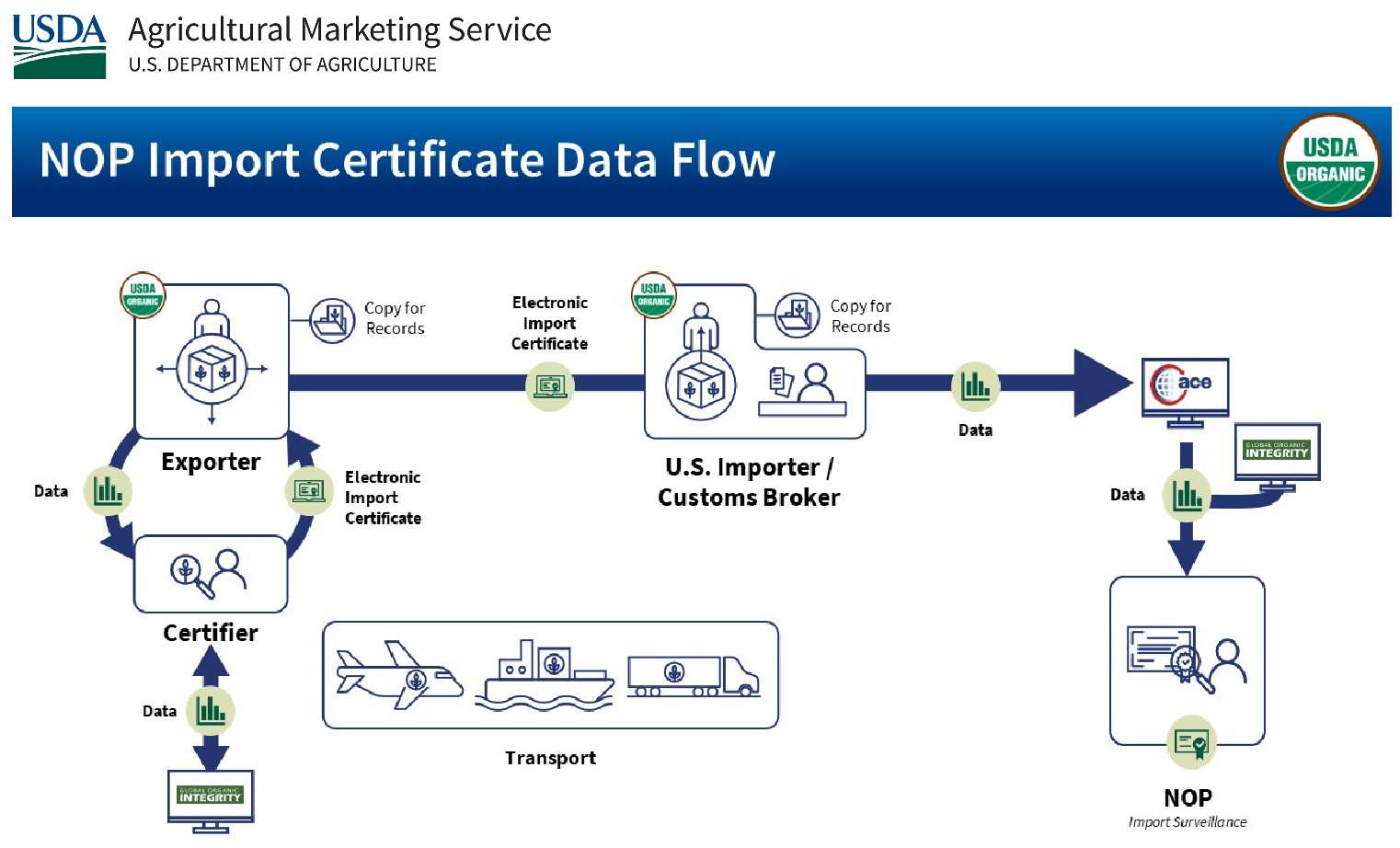Strengthening Organic Enforcement: NOP-Import Certificates

The USDA publishes the “New Final Rule” for the National Organic Program in the USA, which requires all organic imports into the United States to be declared organic and accompanied by a NOP import certificate.. This change will enhance traceability and oversight of organic imports into the United States and thereby make fraud more difficult. A NOP Import Certificate is a transaction certificate that contains detailed information about the origin and quantity of organic products being imported into the United States of America. A NOP Import Certificate is required for all organic imports to the US. All organic imports into the United States must be declared organic and associated with an NOP Import Certificate. The import certificate must be requested and issued before the products leave the country of export.
This includes products certified to the NOP organic standard.
Keep in mind that under the new SOE regulation, all exporters and importers must be certified organic and have an account in the OID to be listed on the NOP Import Certificate. Therefore, be sure to get in touch with your business partners at an early stage already if you work with an uncertified importer and encourage them to apply for certification early. The Regulatory Discretion granted by the NOP so far, will end on September 19th, 2024. This means Kiwa BCS may only issue NOP Import Certificates identifying certified importers.
Operations in need of certification should either contact…
- One of our local offices (includes operators located in Latin America, China, Turkey)
- Your assigned Kiwa service team (includes operators located in Germany, Austria etc.)
- DE.Info.BCS@kiwa.com (Eastern Europe, South Africa, Asia, etc.)
NOP Import Certificate Process
- The exporter in the foreign country requests the NOP Import Certificate from their certifier before the organic product is leaving the country.
- The certifier will review the request and issue the NOP Import Certificate in the USDA Organic Integrity Database prior to the product leaving the exporting country.
- The certifier will provide the NOP Import Certificate to the exporter, who will then provide the certificate information to the U.S. importer.
Each NOP Import Certificate will have a unique identification number. As a part of its standard filing process, the U.S. importer or customs broker enters the NOP Import Certificate number into the CBP ACE system (U.S. Customs and Border Patrol Automated Commercial Environment). This will associate the shipment details in ACE with the import certificate information. The NOP Import Certificate does not have to physically accompany the shipment as long as the data is associated with the shipment in ACE. This process is governed by timelines determined by CBP. The NOP Import Certificate should be available for review at the importer’s organic inspection.
Transaction vs. Time Frame
- The certifier may issue the NOP Import Certificate for a single transaction, or in certain cases, only if sufficient oversight is given, may issue an NOP Import Certificate for a specific time frame. If issued for a set time frame, the NOP Import Certificate covers a certain amount of product shipped over that time period. The allowance for time frame certificates can alleviate the administrative burden for operations with a high frequency of shipments. Certain information can be revised by the certifier after issuance of the NIC, including end date, net weight, number of containers, lot numbers and remarks.
- The validity period should capture the export time frame for associated shipment(s)
- Small buffers are appropriate.
- Allow for extension of NIC if unforeseen delays occur.
Responsibilities for the Exporter to the United States
- Request the NOP Import Certificate from their certifier before shipment.
- Identify products as organic on all export documents, including but not limited to invoices, packing lists, bills of lading, and U.S. Customs and Border Protection entry data.
- Verify that the exported product has not been exposed to a prohibited substance, treated with a prohibited substance as a result of fumigation, or treated with ionizing radiation at any point in the products’ movements across the country border.
Responsibilities for the U.S. Importer
- Ensure that the import is accompanied by accurate NOP Import Certificate data.
- Ensure products are identified as organic on all import documents, including but not limited to invoices, packing lists, bills of lading, and U.S. Customs and Border Protection entry data.
- Maintain import documents on site and make them available for inspection. Verify that the shipment has had no contact with prohibited substances or exposure to ionizing radiation since export. The organic importer must have a documented organic control system to conduct this verification.
Timeline
September 19th, 2024 – Regulatory Discretion Ending:
- Imports to the USA with Organic HTS codes must have a NIC or will be rejected upon shipment filing in ACE (CBP system).
- Customs Brokers are no longer allowed to use temporary (999) code.
- Certifiers may only issue NICs identifying certified importers.
This includes importers physically located outside of the United States, that are acting as the importer of record for such shipments.
For more information and updates from the USDA, visit their Electronic Organic Import Certificate website and review the Strengthening Organic Enforcement Final Rule. Detailed information on NOP Import Certificates can be found in section “B. Imports to the United States”.
You can also visit the Organic Integrity Database (OID) to verify your operation’s profile or your importer’s and whether they are already certified.
For questions, either contact your next local office or DE.Info.BCS@kiwa.com.
